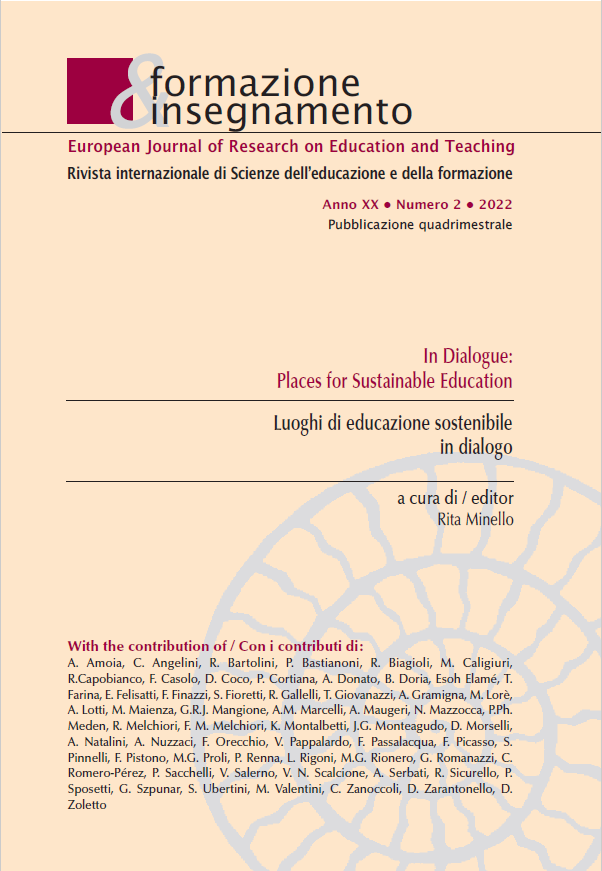Una pedagogia fenomenologica e metacognitiva
DOI:
https://doi.org/10.7346/-fei-XX-02-22_18Parole chiave:
Funzioni cognitive, Funzionamento mentale, Pensiero endofasico, Stili di apprendimento, Pedagogia fenomenologicaAbstract
L’articolo analizza le differenze tra il linguaggio interiore e sociale studiate ampiamente dalla sociolinguistica e dalla psicologia nonché il ruolo svolto nell’apprendimento dal pensiero endofasico o subvocalico. La ricerca scientifica degli ultimi decenni ha evidenziato che i processi di conoscenza sono riconducibili sia ai principi logico-proposizionali che alle immagini mentali (thought images) esaminate in modo particolare da Shepard e Kosslyn. Le funzioni primarie del pensiero, secondo l’interpretazione del cognitivismo, risultano però incomplete e poco fruibili dai docenti nel lavoro d’aula se non sono accompagnate da una visione metacognitiva e fenomenologica. In altre parole, nell’insegnamento le teorie cognitiviste sono funzionali se arricchite da approcci della teoria della mente come, ad esempio, la valorizzazione degli stili di apprendimento. Soltanto una proposta didattica integrata potrebbe ridare nuovo slancio alla scuola italiana per spingerla verso obiettivi ancora lontani dall’essere conseguiti come la personalizzazione, l’inclusione scolastica e la valorizzazione delle differenze.
Riferimenti bibliografici
Bateson, G. (1977). Verso un'ecologia della mente. Milano: Adelphi.
Benedan, S., & Antonietti, A. (1997). Pensare le immagini. Trento: Erickson.
Bertolini, P. (2021). L’esistere pedagogico. Milano: Guerini Scientifica.
Cavalli Sforza, L.L. (2016). L’evoluzione della cultura. Torino: Codice.
Coppi, C.B. (2013). Ascolto, osservo, imparo e… gioco! Torino: Ilmiolibro.it.
Coppi, C.B. (2014). Didattica mentalista applicata e musica. Torino: Ilmiolibro.it.
Damasio, A.R., et al. (1994). L’errore di Cartesio: emozione, ragione e cervello umano. Milano: Adelphi.
De La Garanderie, A. (1982). Pédagogie des moyens d’apprendre. Paris: Bayard.
De La Garanderie, A. (1984). Le dialogue pédagogique avec l’élève. Paris: Bayard.
De La Garanderie, A. (1980). Les profils pédagogiques. Decouvrir les aptitudes
scolaires. Paris: Bayard.
De Saussure, F. (2009). Corso di linguistica generale. Bari: Laterza.
Dilthey, W. (2007). Introduzione alle scienze dello spirito. Milano: Bompiani.
Gordon, T. (2005). Relazioni efficaci. Come costruirle, come non pregiudicarle. Molfetta: La Meridiana.
Halliday, M.A.K. (1985). An introduction to functional grammar. Londra: Arnold.
Kant, I. (2005). Critica della ragion pura. Bari: Laterza.
Kosslyn, S.M. (1989). Le immagini della mente. Creare ed utilizzare le immagini nel cervello. Firenze: Giunti.
Kuhlman, C. (1968). Visual imagery in children. In J. Bruner (Ed.), Lo sviluppo cognitivo (p. 43). Roma: Armando.
Lorenz, K. (1984). Il declino dell’uomo. Milano: Mondadori.
Ogden, R. M. (1951). Oswald Külpe and the Würzburg school. American Journal of Psychology, 64, 4–19.
Piaget, J. (1972). La formazione del simbolo nel bambino. Firenze: La Nuova Italia.
Piaget, J. (1973). Il linguaggio e il pensiero del fanciullo. Firenze: Giunti-Barbera.
Pask, G. (1975). Conversation, cognition and learning. New York: Elsevier.
Piaget, J. (1994). Lo strutturalismo. Milano: Il Saggiatore.
Pylyshyn, Z.W. (1973). What the mind’s eye tells the mind’s brain: a critique of mental imagery. Psychological Bullettin, 80, 1-24.
Rogers, C.R. (1999). Terapia centrata sul cliente. Firenze: La Nuova Italia.
Sacchelli, P. (2005). Prevenire e risolvere le difficoltà ortografiche. Il metodo della Gestione Mentale. Roma: Anicia.
Sacchelli, P. (2009). Il curricolo autentico. Nuovo Gulliver News, 111, pp. 15-16.
Sacchelli, P., & Angeloni, M. (2010). Una didattica metacognitiva e mentalista. Psicologia e Scuola, 8, pp. 9-14.
Sacchelli, P. (2018). Valorizzare le differenze per una scuola inclusiva. Milano: Unicopli.
Sacchelli, P. (2019). Il pensiero e le opere di Antoine De La Garanderie. La pedagogia della Gestione Mentale. Padova: LibreriaUniversitaria.
Shepard, R.N., & Cooper, L. (2012). Mental Images and their Transformations. Boston: IT Press.
Sternberg, R., & Spear-Swerling, L. (1997). Le tre intelligenze. Come potenziare le capacità analitiche, creative e pratiche. Trento: Erickson.
Vygotskij, L.S. (1966). Linguaggio e pensiero. Firenze: Barbera.
Watson, J.B. (1930). Behaviorism. Chicago: University Press.
Watzlawick, P., & Weakland, J.H. (1978). La prospettiva relazionale. Roma: Astrolabio.
Weber, M. (2003). Il metodo delle scienze storico-sociali. Torino: Einaudi.
##submission.downloads##
Pubblicato
Come citare
Fascicolo
Sezione
Licenza
Copyright (c) 2022 Pietro Sacchelli

TQuesto lavoro è fornito con la licenza Creative Commons Attribuzione 4.0 Internazionale.
Formazione & insegnamento è distribuita con la seguente licenza: Attribution 4.0 International (CC BY 4.0).
Per ulteriori dettagli, si rimanda alle Politiche di archiviazione e ai Termini di Copyright e Licenza.





